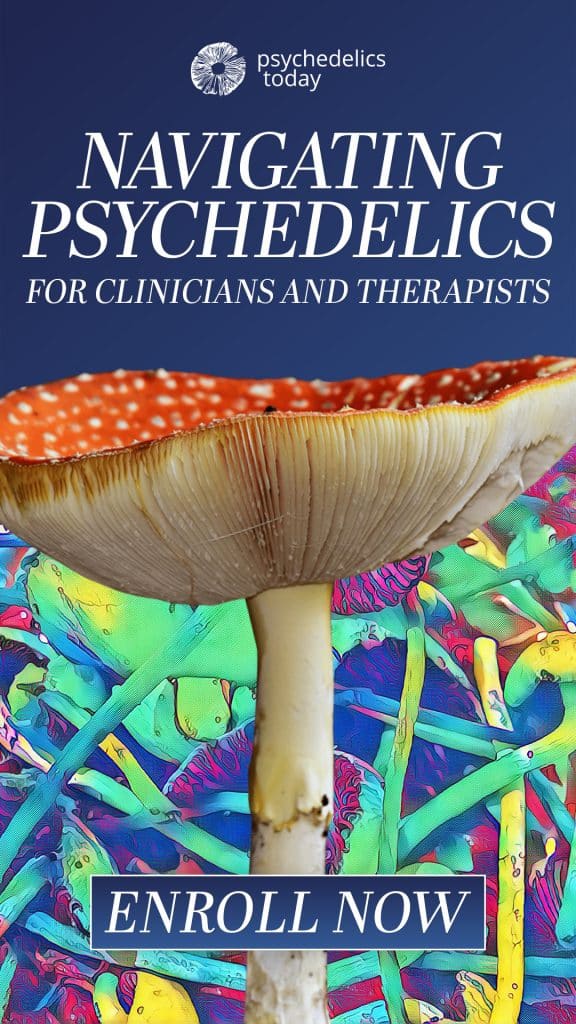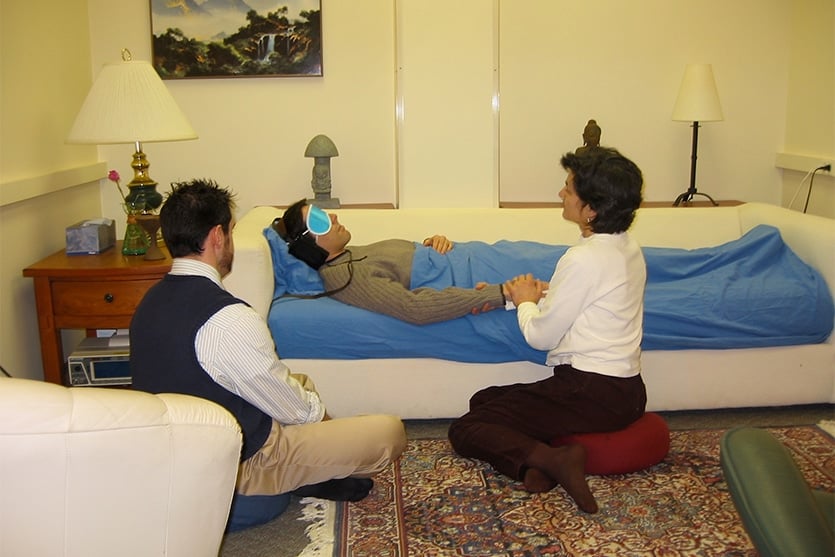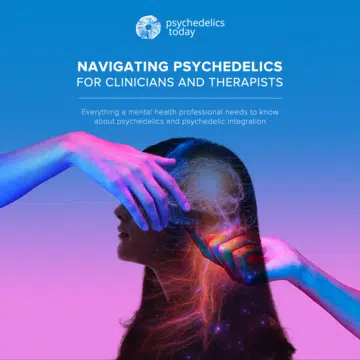Mental health talk is a salient aspect of the zeitgeist; indeed, there’s a tremendous and growing need to address what’s being termed a mental health crisis. But conventional approaches like pharmaceuticals and talk therapy don’t work for everyone, and many people—especially Millennial and Gen Z’ers—still lack access to affordable, long-term mental health care.
Enter psychedelic therapy. Thousands of years of therapeutic use in indigenous settings are now being evaluated in the Western model: Ongoing clinical research explores the therapeutic potential of psychedelics for people with conditions like PTSD, depression, addiction, and end-of-life anxiety. With the psychedelic renaissance underway, there’s a growing sense among professionals and enthusiasts alike that people can heal more quickly and experience profound and lasting change through psychedelic therapy. As the field’s vast potential opens up—with several psychedelics moving through clinical trials and likely Food and Drug Administration (FDA) approval on the horizon—psychedelic therapists will be in demand. So, if you’re wondering how to become a psychedelic therapist, this article is for you.

What is a Psychedelic Therapist?
The world of psychedelic therapy comprises two general camps: medically trained psychedelic therapists and non-medical guides. However, whether or not the latter should be called “psychedelic therapists” is a topic of debate in psychedelia. At the time of writing, a decision on whether or not guides should be regulated in the same manner as psychedelic therapists is a hot-button issue in psychedelic policy reform. In the eyes of the medical community, however, a psychedelic therapist is a licensed psychotherapist (or adjacent professional, such as a psychologist, psychiatrist, or social worker) who’s done additional training in psychedelics.
Read: Consent is Psychedelic, Here’s Why

The FDA is the regulatory body that approves new medical therapies and drugs in the United States. At the time of writing, the FDA has not yet drafted requirements for who will be eligible to administer psychedelic therapy once—and if— the drugs receive approval. Many psychedelic clinical trials use a therapeutic model designed by the Multidisciplinary Association for Psychedelic Studies (MAPS), a non-profit research group that studies the potential of psychedelics in treating mental health conditions. At the time of writing, the MAPS model is the only psychedelic therapy approach granted breakthrough status by the FDA. (It’s important to note that while many credible therapists and researchers are affiliated with MAPS and currently going through their training, MAPS has recently come under scrutiny over allegations of abuse and misconduct.)
Becoming a psychedelic therapist requires different training from that of a shaman, guide, or trip sitter, but some of the skill sets overlap. For instance, the ability to create and hold a safe container for participants may look a bit different in the context of a ceremony and a clinic, but it’s of paramount importance in both settings. Clinical trials of psychedelic therapies— as well as in some of the science-based psychedelic retreat experiences— use a therapeutic model that calls for two practitioners in the room: a fully trained psychotherapist, often an M.D., and a second facilitator with a diverse skill set that may include social work or chaplaincy. Some retreat facilitators may even have coaching, art therapy, or anthropology backgrounds. These second facilitators also undergo psychedelics-specific training before working with patients or clients.
Types of Psychedelic Therapy
In underground settings, people are engaging in therapeutically-intentioned experiences with a wide variety of compounds. The same is not true in clinical settings. To date, psilocybin, LSD, and MDMA are some of the most commonly studied psychedelics in therapeutic practice. Therapists who work with these medicines report using a non-directive approach that differs from many other forms of therapy in that it asks the patient or client to take the lead in their own healing. Still, this research is novel: Clinical trial results need to be confirmed by regulatory bodies and independent scholars, who can make recommendations on the ethics and safety of these powerful therapies.

Psilocybin Therapy
Early clinical trials show promising results for psilocybin-assisted therapies focused on reducing depression, addiction, and end-of-life anxiety. Emerging evidence suggests that psilocybin helps temporarily make the brain more malleable, or “plastic,” which allows for communication among parts that don’t normally interact directly and the potential for “rewiring” maladaptive thought patterns. Psilocybin is also implicated in neurogenesis—the growth or regrowth of neuronal connections damaged by stress and depression.
Read: Psilocybin Therapy and the Rise of Existential Medicine

LSD Therapy
Research on LSD as a treatment for alcoholism began in the 1950s but soon ended due to federal prohibition. LSD, like many other psychedelics, is known to calm the activity of the brain’s default mode network (DMN) and thereby minimize one’s sense of the individual ego-self—an experience often described as spiritual or mystical, and able to promote feelings of interconnection and wellbeing. MAPS research has shown significant reductions in end-of-life anxiety with LSD-assisted therapy, and an ongoing Swiss study is examining LSD’s effect on major depression.
How to Grow Shrooms Bundle
Take Both of Our Courses and Save $90!
MDMA-Assisted Psychotherapy
While MDMA isn’t a classic psychedelic, it’s a quickly rising star in the field of psychedelics therapy, particularly for trauma. In MAPS’ ongoing, multi-phase MDMA study for PTSD, researchers are exploring how, beyond flooding the brain with the feel-good neurotransmitters oxytocin, dopamine, and serotonin, MDMA also helps calms the amygdala (the brain’s fear center) and increases communication between the prefrontal cortex and hippocampus—which helps in processing and resolving traumatic experiences. MDMA is also known as an empathogen, which, under the right circumstances, can increase a person’s sense of openness and sociability long after a session.
Pros and Cons of Psychedelic Therapy
The potential of psychedelic-assisted therapy is nothing short of healing. Clients can access memories, feelings, and beliefs about themselves and others that may have been repressed or ignored; by examining these with the nonjudgmental support of a therapist, clients often gain insights that help free them from maladaptive thoughts and behaviors. Psychedelics are also known to help broaden people’s perspectives to encompass the interrelationship with nature and other beings—a spiritual experience for some that helps simplify the everyday problems of the ego-centered self.
“Think of psychedelic therapy like a tree,” says UK-based clinical psychologist Dr. Rosalind Watts, who served as the clinical lead and clinical director for trials with the Imperial College of London and Synthesis Institute. “You can go right down to the roots quicker—and you can also go up to the sky quicker and see that sense of the big self, the web of interconnection of life.”
“Think of psychedelic therapy like a tree. You can go right down to the roots quicker—and you can also go up to the sky quicker and see that sense of the big self, the web of interconnection of life.”
Despite the presence of a therapist, psychedelic therapy is ultimately a more self-led process that honors each person’s individual healing path and is therefore potentially even more empowering for the client.
It’s also about accessibility. Traditional talk therapy is time-consuming and prohibitively expensive for many people, while psychedelic therapy—once approved and widely available—may help those who aren’t able to get the help they need through more conventional pathways.

But there are caveats.

A client’s vulnerability and suggestibility increase dramatically under the influence of psychedelics, further complicating any problems within the therapy container. “With psychedelic therapy,” says Dr. Watts, “there’s an increased risk of boundary violations because of the intensity of the work, the really long sessions, these feelings of love that are often there, and very strong projections onto the therapist of being this wonderful healer.” Indeed, abuses—including inappropriate sexual relationships—have been reported in both the underground and the aboveground psychedelic settings.
For this reason, Dr. Watts believes that a person seeking to work as a psychedelics facilitator in any capacity should have a proven track record as a “safe pair of hands” when guiding people in vulnerable states. To work in the field, says Dr. Watts, “one’s mission should be to fully support others—not to develop one’s own status, power, and fame.”Further, says Dr. Watts, we’ve idealized psychedelic therapy since observing its potential to profoundly help people—in promising, but ultimately small, clinical trials. As the field goes mainstream, Dr. Watts believes that adverse events such as psychotic episodes, or possibly even suicides, will increase. “The risk,” she says, “is that with psychedelics, people can go to deep, difficult, raw places very easily. It can be overpowering and intense.”
“The biggest pro of psychedelic therapy is that it’s so powerful to bring change. The biggest con is also that it’s so powerful to bring change; if you don’t have a therapeutic container or a supportive community around you, it can be extremely intense—and can even destabilize your life.”
“The biggest pro of psychedelic therapy is that it’s so powerful to bring change. The biggest con is also that it’s so powerful to bring change; if you don’t have a therapeutic container or a supportive community around you, it can be extremely intense—and can even destabilize your life,” says Watts.
How To Become A Psychedelic Therapist
In a 2019 interview with Tim Ferriss, Marcela Ot’alora, principal investigator for a MAPS-run MDMA trial, emphasized the inner work required to be able to hold space for people undergoing psychedelic therapy. “Really understand who you are, how your experiences have shaped you, how comfortable you feel with your own suffering,” she advised. “The only way to not be afraid of someone’s suffering is if you’re not afraid of your own.”
Additionally, curiosity, humility, patience, empathy, dedication to service, generosity of spirit, and the willingness to keep learning are all helpful personal qualities to bring to the table. Long sessions are par for the course, so resiliency and endurance are key.

It’s also important to “encourage people to connect with their own wise inner healer,” says Jess Grotfeldt, a longtime psychedelic retreat facilitator, ceremony leader, and founder of Luz Eterna psilocybin retreats for women. A psychedelic therapist should be comfortable working with people in a way that’s non-directive and know one’s own limitations as a therapist—including when it’s time for a client or patient to receive help from someone else. Above all, says Grotfeldt, prospective psychedelic therapists should cultivate an abundance of inner calm and grounding because, she says, “spiritual and psychological emergencies can come up in these moments.”
And because the science falls short of fully explaining what’s happening during a psychedelic therapy session (brain scans, Dr. Watts says, reveal only a part of the picture), it’s important to be able to sit with the uncertainty of not knowing exactly how healing takes place. “We have our little puzzle piece,” says Dr. Watts, “but really, it’s a great mystery.”
Is it Important to Have Had Psychedelic Experiences Before Becoming a Psychedelic Therapist?
Generally speaking, certification programs don’t mandate that graduates have their own psychedelic experiences, but most therapists and facilitators do emphasize the importance of having grappled with altered states of consciousness before helping others. “If you’re going to be sitting with people, navigating the challenges that come up,” says Grotfeldt, “I think it’s really important to have a deep understanding of the medicine.” There are entirely unique aspects of the psychedelic healing experience, she says, that distinguish it from other types of altered states.
Read: More Therapists Need Psychedelic Integration Training

Psychedelic Therapy Training & Psychedelic Therapist Certification
Training and certification is expected to be required to practice psychedelic therapy. The FDA is still in the process of evaluating MDMA, LSD, and psilocybin therapies. As such, qualifications for psychedelic therapists in future clinical settings are still to be decided. Some states—like the state of Oregon—are in the process of legalizing some forms of facilitated psychedelic experiences in advance of FDA approval. Still, these emerging programs do require some form of specialized training.
How to Grow Shrooms Bundle
Take Both of Our Courses and Save $90!
In clinical trials to date, a medical doctor—often a psychiatrist or psychologist—oversees therapy sessions alongside a facilitator with a different skill set, such as a licensed social worker. But as these new and alternative therapies are approved and put to use in a wider population, it’s likely that a wider variety of practitioners will be able to provide psychedelic therapy. For now, programs like the Boulder, Colorado-based Naropa Institute’s Psychedelics-Assisted Therapies Certificate—which welcomed its inaugural class of 108 trainees with backgrounds in therapy, chaplaincy, and healthcare—must follow MAPS’ lead in formulating training programs likely to hold up to FDA approval.
Psychedelic therapy training comes with ethical responsibilities and implications that must be explored. “In my view,” says Sara Lewis, Ph.D., faculty co-director at the Naropa Institute program, “an excellent gauge as to whether a program is safe and reputable is how much humility its leaders, trainers, faculty, and then by extension, the program’s trainees seem to have. A major red flag are programs where practitioners position themselves as spiritual experts who see themselves as liberating their clients.”
“A major red flag are programs where practitioners position themselves as spiritual experts who see themselves as liberating their clients.”
Because abuses in the psychedelic therapeutics space can and have occurred, evaluating a program’s engagement with difficult conversations around power is vital. “Programs which are trauma-informed and culturally responsive will set trainees on a slow path, ideally helping them to first better understand their own relationship to power, including how their own identities and social locations impact their work as a psychedelic therapist,” says Dr. Lewis. She emphasizes the “critical” nature of this aspect of psychedelics therapy training, and the onus on programs to help trainees grapple with issues of privilege and power dynamics when it comes to race, gender, sexuality, and other identities. Even trainees who identify as part of marginalized groups can benefit from this kind of work. “For me, it is critical that none of us feel we are somehow above (or beyond) doing harm. This is true for us as individuals and as institutions.”

It’s an ongoing process, according to Dr. Lewis, who believes the field is “just beginning the kind of thoughtful, challenging, painful, and deeply needed work of understanding abuse and misconduct in the psychedelic space.” Other psychedelic therapy training programs include the California Institute for Integrative Studies (CIIS), which began offering a certificate in psychedelic-assisted therapies and research for licensed clinicians and ordained clergy in 2016. MAPS offers a 100-hour MDMA Therapy Training for psychotherapists wishing to take part in future clinical trials or to be in a position to potentially administer MDMA therapy in clinics once it’s approved. (Naropa trainees also receive the 100-hour MAPS MDMA training.) Fluence offers a 150-hour certificate training for licensed therapists seeking to help clients integrate their psychedelic experiences. The Netherlands-based Synthesis Institute is enrolling its first 18-month Psychedelic Practitioner Training cohort in the summer of 2022 and is open to applicants of a wider variety of backgrounds. Usona also offers certifications for clinicians involved in their psychedelic studies.
Volunteer First
If you aren’t yet a licensed psychotherapist and seek to explore the work prior to undergoing an intensive training program, consider volunteering with a peer-support organization for psychedelics such as the Zendo Project (affiliated with MAPS) or the Fireside Project. You can be trained as a volunteer to sit with people experiencing some level of challenge in their experiences at concerts, festivals, or by phone and provide needed support while gaining insight into the work of psychedelic therapy.
Consider the Importance of the Work
Grotfeldt, who’s worked with psychedelics in some capacity for 20 years, encourages those who are interested in exploring a vocation as a psychedelic therapist to consider their why. The work of helping people navigate and integrate their psychedelic experiences can change lives—and it has renewed Jess’ hope for the future. “A lot of people are getting into it as kind of a fad or a new thing,” she says. “I believe it’s more of a calling.”
Respect Patient’s Rights and Vulnerability
It’s important to acknowledge that abuse and misconduct have occurred in therapeutic and training contexts. Psychedelic therapists are responsible for upholding safe and ethical spaces for their patients. If a violation of therapeutic responsibility has occurred, it is in the patient’s right to file a complaint against the therapist with the overseeing licensing board in their state. If necessary, a patient may also take legal action against a therapist, instructor, or institution.

DoubleBlind is a trusted resource for news, evidence-based education, and reporting on psychedelics. We work with leading medical professionals, scientific researchers, journalists, mycologists, indigenous stewards, and cultural pioneers. Read about our editorial policy and fact-checking process here.

DoubleBlind Magazine does not encourage or condone any illegal activities, including but not limited to the use of illegal substances. We do not provide mental health, clinical, or medical services. We are not a substitute for medical, psychological, or psychiatric diagnosis, treatment, or advice. If you are in a crisis or if you or any other person may be in danger or experiencing a mental health emergency, immediately call 911 or your local emergency resources. If you are considering suicide, please call 988 to connect with the National Suicide Prevention Lifeline.



